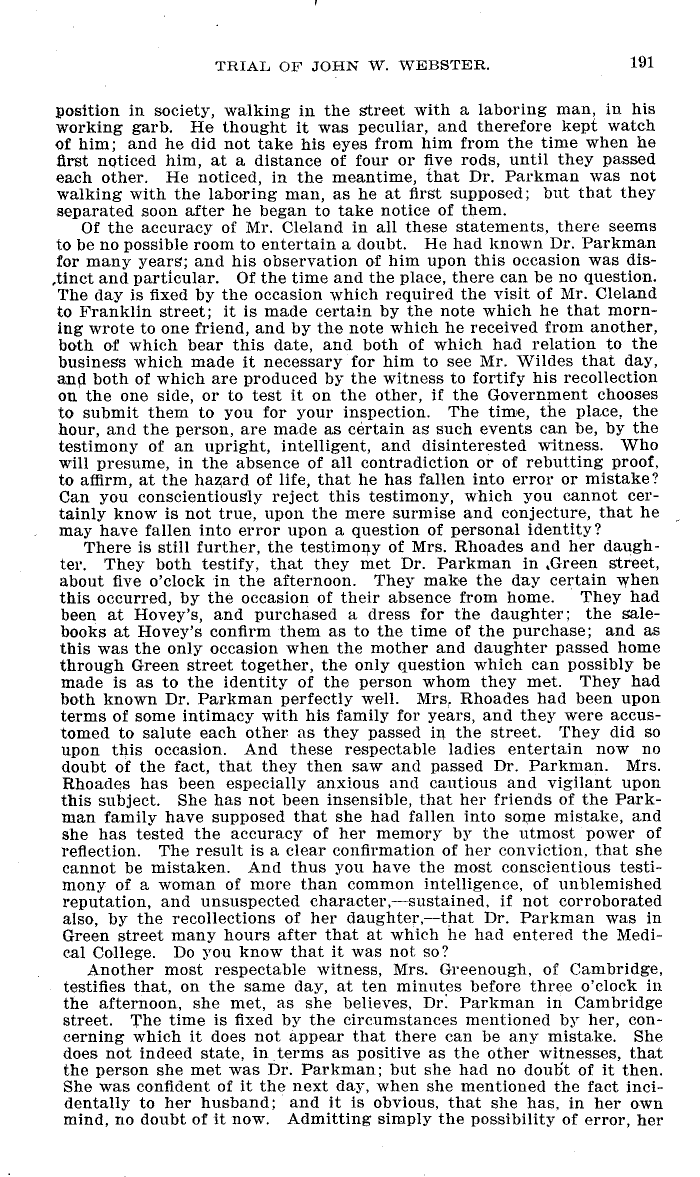|
TRIAL OF JOHN W. WEBSTER. 191
position in society, walking in the street with a laboring man, in his
working garb. He thought it was peculiar, and therefore kept watch
of him; and he did not take his eyes from him from the time when he
first noticed him, at a distance of four or five rods, until they passed
each other. He noticed, in the meantime, that Dr. Parkman was not
walking with the laboring man, as he at first supposed; but that they
separated soon after he began to take notice of them.
Of the accuracy of Mr. Cleland in all these statements, there seems
to be no possible room to entertain a doubt. He had known Dr. Parkman
for many years; and his observation of him upon this occasion was dis-
tinct and particular. Of the time and the place, there can be no question.
The day is fixed by the occasion which required the visit of Mr. Cleland
to Franklin street; it is made certain by the note which he that morn-
ing wrote to one friend, and by the note which he received from another,
both of which bear this date, and both of which had relation to the
business which made it necessary for him to see Mr. Wildes that day,
anti both of which are produced by the witness to fortify his recollection
on the one side, or to test it on the other, if the Government chooses
to submit them to you for your inspection. The time, the place, the
hour, and the person, are made as certain as such events can be, by the
testimony of an upright, intelligent, and disinterested witness. Who
will presume, in the absence of all contradiction or of rebutting proof,
to affirm, at the hazard of life, that he has fallen into error or mistake?
Can you conscientiously reject this testimony, which you cannot cer-
tainly know is not true, upon the mere surmise and conjecture, that he
may have fallen into error upon a question of personal identity?
There is still further, the testimony of Mrs. Rhoades and her daugh-
ter. They both testify, that they met Dr. Parkman in ,Green street,
about five o'clock in the afternoon. They make the day certain when
this occurred, by the occasion of their absence from home. They had
been at Hovey's, and purchased a dress for the daughter; the sale-
books at Hovey's confirm them as to the time of the purchase; and as
this was the only occasion when the mother and daughter passed home
through Green street together, the only question which can possibly be
made is as to the identity of the person whom they met. They had
both known Dr. Parkman perfectly well. Mrs, Rhoades had been upon
terms of some intimacy with his family for years, and they were accus-
tomed to salute each other as they passed in the street. They did so
upon this occasion. And these respectable ladies entertain now no
doubt of the fact, that they then saw and passed Dr. Parkman. Mrs.
Rhoades has been especially anxious and cautious and vigilant upon
this subject. She has not been insensible, that her friends of the Park-
man family have supposed that she had fallen into some mistake, and
she has tested the accuracy of her memory by the utmost power of
reflection. The result is a clear confirmation of her conviction, that she
cannot be mistaken. And thus you have the most conscientious testi-
mony of a woman of more than common intelligence, of unblemished
reputation, and unsuspected character,-sustained, if not corroborated
also, by the recollections of her daughter,--that Dr. Parkman was in
Green street many hours after that at which he had entered the Medi-
cal College. Do you know that it was not so?
Another most respectable witness, Mrs. Greenough, of Cambridge,
testifies that, on the same day, at ten minutes before three o'clock in
the afternoon, she met, as she believes, Dr. Parkman in Cambridge
street. The time is fixed by the circumstances mentioned by her, con-
cerning which it does not appear that there can be any mistake. She
does not indeed state, in terms as positive as the other witnesses, that
the person she met was Dr. Parkman; but she had no doulit of it then.
She was confident of it the next day, when she mentioned the fact inci-
dentally to her husband; and it is obvious, that she has, in her own
mind, no doubt of it now. Admitting simply the possibility of error, her
|

